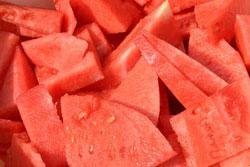Struggling with high blood pressure? Skip the sugary drinks and reach for a slice of watermelon instead! This summertime favorite isn't just delicious and hydrating, it's also a heart-healthy powerhouse.
Studies show that watermelon may help manage high blood pressure naturally thanks to a unique blend of vitamins, minerals, and powerful plant compounds. Discover how watermelon can support your heart health, explore delicious ways to enjoy it, and learn everything you need to know about incorporating this refreshing fruit into your diet for healthy blood pressure.
More Than Just Delicious: Vitamins, Minerals, and Lycopene
Watermelon is over 90% water, making it super hydrating. But that's not all! It's packed with antioxidants like vitamins A and C, plus heart-healthy minerals like potassium and magnesium. These minerals play a crucial role in regulating blood pressure by helping your body get rid of excess sodium through urine.
The real stars of the show, though, are two special nutrients called phytonutrients. These naturally occurring compounds work wonders in our bodies, and some play a key role in lowering blood pressure.
What are the phytonutrients in watermelon that lower blood pressure?
Watermelon boasts two main phytonutrients that contribute to its blood pressure-lowering effects:
- Lycopene : This vibrant red pigment acts as an antioxidant, protecting your heart tissue from damage. In fact, watermelon has even more lycopene than tomatoes! To get the most lycopene punch, choose a fully ripe watermelon with a deep red color. Partially ripe ones with white or pink flesh have barely any lycopene.
- Citrulline: This amino acid is converted by your body into another amino acid called arginine. Arginine helps improve blood circulation and even boosts your immune system! When your body converts citrulline to arginine, it also releases nitric oxide . This nifty molecule relaxes your blood vessels, leading to lower blood pressure and a healthier heart. Studies suggest watermelon's effect can be almost as powerful as some blood pressure medications, but without the side effects!
Best Way to Eat Watermelon for Blood Pressure
There's no single "best" way to enjoy watermelon for blood pressure benefits. The key is to incorporate it into your diet regularly. Here are some delicious ideas:
- Classic Wedges: Slice it up! It's a simple and satisfying way to enjoy watermelon's refreshing taste and reap the benefits. You can even munch on the seeds – they're a good source of healthy fats and plant-based protein.
- Mint Medley: Feeling fancy? Combine watermelon cubes with chopped mint leaves. Mint is also thought to have some blood pressure-lowering properties, making this a doubly delicious heart-healthy treat!
- Tropical Twist: Love pineapple and papaya? These fruits are rich in potassium, another mineral that helps lower blood pressure. Mix watermelon, pineapple, and papaya cubes in a bowl, sprinkle with a touch of rock salt for extra flavor, and enjoy this refreshing tropical salad!

How Much Watermelon Should I Eat Daily to Lower Blood Pressure?
There's no one-size-fits-all answer to this question. However, studies suggest that consuming 2-3 cups (470-710 grams) of watermelon daily for several weeks can significantly reduce blood pressure.
Is Watermelon Juice as Effective as Medication for High Blood Pressure?
Watermelon juice can be a helpful addition to a heart-healthy diet, but it shouldn't replace medication prescribed by your doctor. While studies show promise for watermelon's blood pressure-lowering effects, more research is needed to determine its effectiveness compared to medications.
Healthy Recipes with Watermelon
Watermelon's versatility makes it a perfect ingredient for delicious and healthy recipes. Here are a few ideas:
- Watermelon Gazpacho: This chilled soup is perfect for a hot summer day. It's packed with flavor and nutrients from watermelon, tomatoes, cucumber, and other healthy ingredients.
- Watermelon Feta Salad: Combine watermelon cubes, crumbled feta cheese, red onion, and fresh mint for a light and refreshing salad. Drizzle with a simple olive oil and balsamic vinegar dressing.
- Watermelon and Arugula Pizza: This unique pizza is a fun twist on a classic. Top a whole wheat crust with a light tomato sauce, mozzarella cheese, sliced watermelon, and arugula for a delicious and healthy meal.
Can Diabetics Eat Watermelon for Blood Pressure Control?
Yes, diabetics can enjoy watermelon in moderation as part of a healthy diet. While watermelon does contain natural sugars, its glycemic index (GI) is
relatively low (around 76), meaning it has a minimal impact on blood sugar levels. However, it's always best to consult with your doctor or registered dietitian for personalized advice on incorporating watermelon into your diabetic meal plan.
Does Watermelon Interact with Blood Pressure Medications?
Watermelon is generally safe for most people. However, if you take blood pressure medications, it's important to talk to your doctor before significantly increasing your watermelon intake. Watermelon's blood pressure-lowering effects may interact with certain medications, potentially causing your blood pressure to drop too low.
Are There Side Effects?
Watermelon is a safe and healthy fruit for most people. However, some people may experience mild digestive issues like bloating or diarrhea, especially if they consume large amounts. If you experience any discomfort, try eating watermelon in moderation or consult your doctor.
Bottom Line
Watermelon is a delicious and refreshing fruit that offers a surprising range of health benefits, including potential support for managing high blood pressure. Packed with vitamins, minerals, and unique phytonutrients like citrulline and lycopene, watermelon can be a valuable addition to a heart-healthy diet.
Enjoy watermelon in its natural state, incorporate it into delicious recipes, or whip up a refreshing and nutritious juice. Whichever way you choose to enjoy it, this summer staple can be a sweet and healthy way to support your heart health.
Remember, a balanced diet and healthy lifestyle are crucial for managing high blood pressure. Consult with your doctor to create a personalized plan that's right for you.
